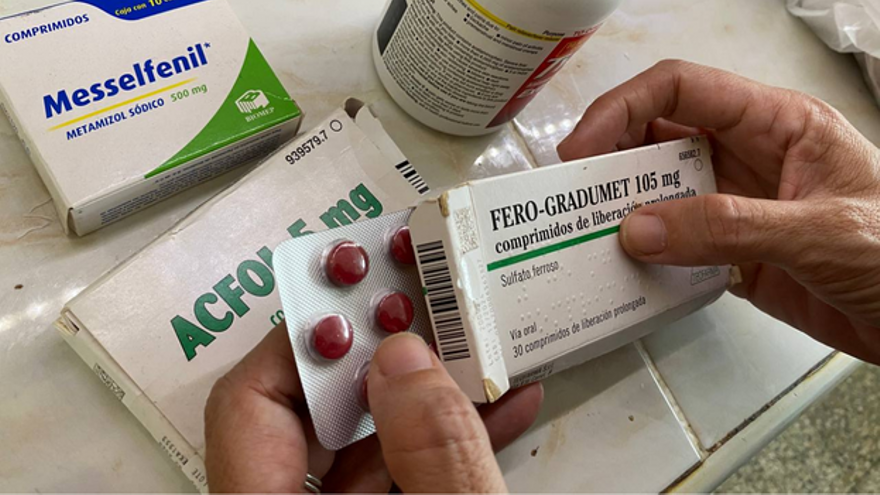
![]() 14ymedio, Juan Izquierdo, Havana, 18 August 2022 — The old emigrant joke about Miami, Cuba’s last province, threatens to become a reality. Some medications are becoming scarce in the big city of Florida. “When I go to a pharmacy, they tell me that they’re out of medicine, that people took everything to send it to Cuba,” complains Enrique, who has been residing in the United States for ten years.
14ymedio, Juan Izquierdo, Havana, 18 August 2022 — The old emigrant joke about Miami, Cuba’s last province, threatens to become a reality. Some medications are becoming scarce in the big city of Florida. “When I go to a pharmacy, they tell me that they’re out of medicine, that people took everything to send it to Cuba,” complains Enrique, who has been residing in the United States for ten years.
Enrique has toured the pharmacies of the city to put together a package of medical supplies. His mother in Cuba has been undergoing breast cancer treatments for a year and will now face an operation in Villa Clara. Distressed, Enrique understands that his family’s only hope is for him to get the necessary medications and equipment, because, according to the warning of Cuban doctors, “there is nothing here.”
Telephone in hand and driving through the streets of Miami, Enrique consults the list sent to him by his relatives. “Every time I go to a pharmacy they tell me the same thing: they know what to sell me, because all Cubans ask for the same thing, but there isn’t any. The demand is so great that even here things are in short supply,” Enrique laments.
“What is most ’lost’,” he explains, “is the thread for sutures, surgical gloves and anesthesia.” Enrique’s inventory is meticulous. What is missing in one pharmacy must be “hunted” in another, even if it’s in a different city. The operation requires two types of suture thread, thinner for the inside and another kind to close the wound. He needs to get 18 or 20 caliber catheters, which are needed for transfusions and serums.
“Five packs of cotton swabs, four bandages, cotton, 20 compresses, syringes, several rolls of tape, two packages of saline solution … and that’s just the beginning,” Enrique says. The “Cuban” doctor is so visible that, if it weren’t for the fact that they manage to get him the Surgivac drainage equipment, there would be no way to buy it. “It cost me 180 dollars,” says the man, who also paid a good amount for the intravenous anesthetic Propofol and the iodized povidone.
“Then will come the long recovery process,” he adds, “and my mom will need more gauze and cotton, an elastic bandage with pins, a larger bandage to cover her torso and compresses for each treatment.”
A doctor friend is the one who prepares the list, which Enrique’s mother then sends him. The Cuban health workers themselves admit what they have and what they don’t. “And they have less and less. The Government has already gotten used to the fact that we will do anything to get our relatives operated on. It’s either yes or yes: who’s going to let his mother die for not sending her medicines?”
Like Enrique, many Cubans living abroad are between a rock and a hard place. They don’t have any way to quickly ask for reunification with their relatives, and they’re not willing to subject them to the hard journey through Central America to the U.S. border. “It’s a desperate situation,” says Enrique.
A new message comes in on the phone. His mother is waiting for her turn in the oncology area of the Santa Clara Clinical Surgical Teaching Hospital. As the center ran out of water, a noisy pipe pumps in the liquid and prevents patients from resting. Those who come to be treated avoid the puddles and cables that flood the reception area, so that a slip doesn’t turn into a hip fracture or worse.
“Next week I’m leaving for Cuba,” Enrique concludes. “That means that my suitcases not only carry the medicines and equipment, but also a pair of flip-flops for my mom, two night gowns, clothes for cousins, cookies, preserves, jams, whatever it takes to ’sweeten’ a little everything that is happening.”
The drug deficit in Miami and other Florida cities seemed like an unusual situation, but it has already become a daily occurrence for Cubans living in the United States. Phenomena such as “resolving” how to find products, waiting several hours to make a purchase and the mistreatment of pharmacists and sellers resurrect the worst nightmares of Cuban exile. The Government of the Island, meanwhile, continues to proudly brandish, and through the export of its own health workers to other countries, the label of “medical power.”
Translated by Regina Anavy
____________
COLLABORATE WITH OUR WORK: The 14ymedio team is committed to practicing serious journalism that reflects Cuba’s reality in all its depth. Thank you for joining us on this long journey. We invite you to continue supporting us by becoming a member of 14ymedio now. Together we can continue transforming journalism in Cuba.
